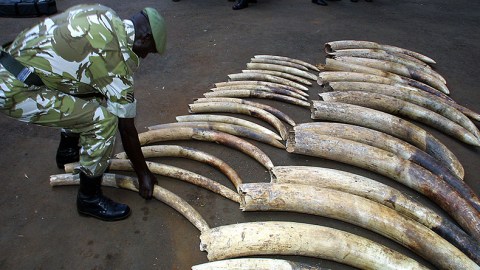U.S. Takes on African Elephant Poaching with Big Policy Move

The U.S. Fish and Wildlife Service issued new rules to protect African elephants hunted for their ivory tusks. Policy changes have been sorely needed, since an estimated 96 elephants a day are killed to harvest their ivory. The African elephant has been listed as “threatened” through the Endangered Species Act since 1978.
The U.S. is the world’s second largest retail market for ivory products, and the states of California, Hawaii, and New York, are particular hotspots. Individual states have already passed some restrictions.
Before the policy change, those selling ivory in the U.S. only had to assert that the source elephants died of natural causes or were hunted before bans came into place. Under the new rule, almost all import/export across state lines is illegal, save for some exceptions such as for 100-year-old antiques and musical instruments.
China, which has the world’s largest ivory market, has also been taking steps over the past years to limit its ivory imports. Some wonder whether the new near-complete ban on ivory by the U.S. will encourage Chinese leaders to follow suit.
Since the ivory market drives such devastating hunting practices, who would buy from it? Surprisingly, a poll by National Geographic and GlobeScan showed that most of the people who buy ivory do support bans on selling it. But there’s still a strong appeal for ivory among young people who are lower-income or middle class and want to “project an image of wealth and social status.”
The survey also found that purchasers of ivory often show a disconnect, thinking that their small consumption of ivory don’t cause an impact, and that elephants aren’t all that endangered in the first place. There’s also often a feeling that the government will take care of the situation and prevent animals from going extinct.
So can the new U.S. policy make an impact? Potentially yes. Poaching for ivory tusks went way down after 1989, when international agreements banned its trade, before going back up as traders figured out loopholes. But most experts also feel that the biggest and most long-term solution is to eliminate the demand — that is convince people not to purchase ivory in the first place and thereby take away the market.
—
Header Image: SIMON MAINA / Stringer





